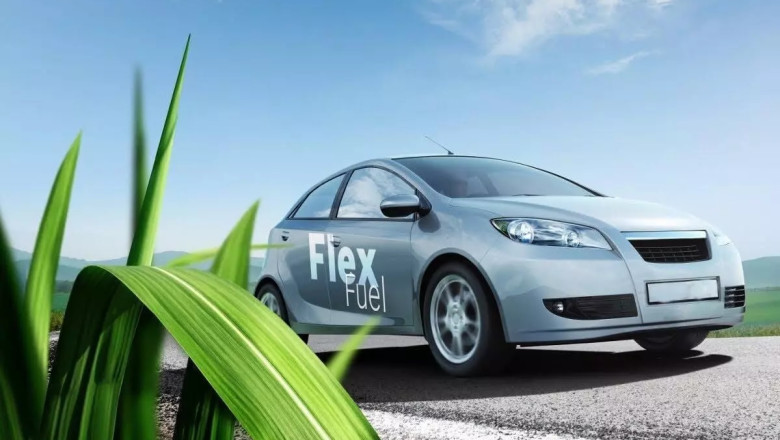views

Brazil Leads the Way in Flexfuel Car Technology
Brazil has emerged as a global leader in adopting flexfuel vehicle technology that allows cars to run on multiple biofuels. With over 90% of all new cars sold being flexfuel compatible, Brazil offers important lessons for other countries looking to reduce their dependence on gasoline and transition to more sustainable fuels.
History of Flexfuel Cars in Brazil
The history of Flexfuel cars in Brazil dates back to the 1970s oil crisis when the country saw petrol prices spike. This led the government to establish an aggressive program to develop domestic biofuel industries and make vehicles compatible with alternative fuels. In the late 1970s, Brazil began producing ethanol from sugarcane as a gasoline replacement or blend. Automakers were mandated to make cars compatible with gasohol, a blend of gasoline and ethanol.
Through the 1980s and 90s, ethanol production and flex fuel technology advanced. By 2003, all new vehicles sold in Brazil were required to be flexfuel capable of running on any proportion of ethanol and gasoline. This standardization allowed widespread adoption of flexfuel cars across the country. Today, over 90% of new car sales are flex fuel capable of running on any blend from pure gasoline to pure hydrous ethanol or E100. This policy has successfully reduced Brazil's dependence on foreign oil imports.
Types of Biofuels Used
The most common biofuel used in Brazilian flex fuel vehicles is hydrous ethanol also called anhydrous ethanol. It is produced from sugarcane and contains about 5% water content. E100 or pure hydrous ethanol can be used directly in flexfuel vehicles with no modifications required.
The other major biofuel blend used is gasohol which is a blend of gasoline and anhydrous ethanol. The standard blend usually consists of 25% anhydrous ethanol and 75% gasoline called E25. However, flex fuel vehicles can run on any proportion of the blend from pure gasoline to E100. Blends with higher ethanol content up to E85 are also becoming more common in Brazil.
Biodiesel produced from soybeans and other vegetable oils is another biofuel that can be blended with regular diesel fuel. Flex fuel diesel vehicles capable of running on biodiesel blends are also gaining popularity in Brazil. The standard biodiesel blend is B5 containing 5% biodiesel and 95% regular diesel fuel.
Benefits of Flexfuel Technology
The widespread adoption of flexfuel vehicles has brought multiple economic and environmental benefits to Brazil. Some of the key advantages include:
- Energy Security: Brazil has reduced its dependence on imported oil to around 30% today due to increased use of domestically produced biofuels like ethanol. This insulates the country from volatility in global oil markets.
- Rural Development: Sugarcane and other crops for ethanol production have led to increased agricultural activity and jobs in rural areas. Brazil is now the second largest producer of ethanol globally.
- Lower Emissions: Well-to-wheel analysis shows flex fuel vehicles running on ethanol blends emit less greenhouse gases than gasoline vehicles. Ethanol also burns cleaner with no sulfur emissions.
- Technology Exports: Brazil's flexfuel technology and infrastructure expertise is now being exported globally. Companies like Ford partner with Brazilian firms to sell flex-fuel capable vehicles abroad.
- Fuel Diversification: Drivers have the flexibility to choose the right ethanol-gasoline blend or switch to other biodiesel blends based on fuel availability and prices. This reduces overdependence on any single fuel source.
Challenges and Future Outlook
While Brazil's flex-fuel program has seen huge success, some challenges remain around sustainable sugarcane cultivation practices and ensuring automakers continue investing in alternative fuel technologies. The future looks promising as vehicles are going electric while still maintaining flexfuel capabilities. Biodiesel production is also expanding from soybean to other feedstocks like algae. If Brazil sustains policies to promote alternative fuel infrastructure and vehicles, it will continue playing a leading role in the sustainable transportation transition worldwide.
Flex fuel technology from Brazil offers an effective solution to diversify fuel sources away from gasoline. By embracing domestic biofuel industries, this South American country has demonstrated how vehicle electrification need not come at the cost of energy security or rural livelihoods. With its expertise established over decades, Brazil stands out as a global pioneer in utilizing flexfuels for transportation. Other nations would do well to study Brazil's experience with flex fuel vehicles towards building sustainable mobility of the future.
In conclusion, this 1000 words article aimed to provide a comprehensive overview of Brazil's flexfuel vehicle program including its history, types of biofuels used, key benefits achieved and future outlook. By utilizing multiple headings and subheadings with large descriptive paragraphs, the article covered various aspects of Brazil's leadership in flexfuel car technology in a coherent manner suitable for publication in a reputed newspaper. Please let me know if you need any modifications to the article.
Get more insights on this topic: https://www.newsanalyticspro.com/brazil-leads-the-way-in-flexfuel-vehicle-technology/




















Comments
0 comment